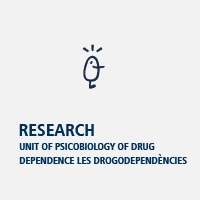Dr. Olga Valverde Granádos, Full Professor of Psychobiology. Neurobiology of Behavior Research Group (GReNeC). Health and Experimental Sciences Department. Universitat Pompeu Fabra. Neuroscience Program. IMIM. (Hospital del Mar Medical Research Institute). Barcelona Biomedical Research Park.
On 15 December 2016 Dr. Olga Valverde presented a summary of the last researches she has carried out in her laboratory regarding cocaine and alcohol consumption.
Willing to know the vulnerability factors involved in the addiction process, they are studying the effect of exposure to stress, since it is an environmental factor involved in drug-induced neuroplasticity. She showed us the protocol to induce stress in adolescence, which she has developed with her research team, using the animal model of maternal deprivation.
With this procedure they have observed behavioural and biochemical effects. On the one hand, the adolescent mice under stress present more behaviours of despair (anhedonia) and anxiety, which are evaluated with the Tail Suspension Test and the Plus Maze. They have also observed a decrease in neurotrophic factors (BDNF) and increased indicators of oxidative stress and pro-inflammation.
These mice also show greater reinforcement than they have observed using both the conditioned place preference (CPP) and self-administration. In addition, on contact with drugs (cocaine and alcohol), they observe that dopaminergic function is altered, with dopamine hypofunction and D2 receptor decrease.
Her basic research studies attempt to model the effect that deprotection, abandonment and maternal absence can have on the action of drugs in one of the initial stages of contact with them, such as adolescence.
Images:











